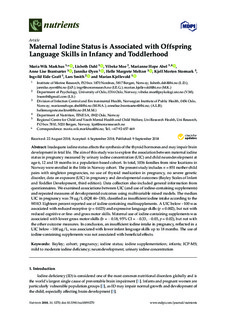Maternal Iodine Status is Associated with Offspring Language Skills in Infancy and Toddlerhood
| dc.contributor.author | Wik, Maria | |
| dc.contributor.author | Dahl, Lisbeth | |
| dc.contributor.author | Moe, Vibeke | |
| dc.contributor.author | Abel, Marianne Hope | |
| dc.contributor.author | Brantsæter, Anne Lise | |
| dc.contributor.author | Øyen, Jannike | |
| dc.contributor.author | Meltzer, Helle Margrete | |
| dc.contributor.author | Stormark, Kjell Morten | |
| dc.contributor.author | Graff, Ingvild Eide | |
| dc.contributor.author | Smith, Lars | |
| dc.contributor.author | Kjellevold, Marian | |
| dc.date.accessioned | 2018-09-20T12:50:19Z | |
| dc.date.available | 2018-09-20T12:50:19Z | |
| dc.date.created | 2018-09-18T11:18:26Z | |
| dc.date.issued | 2018 | |
| dc.identifier.citation | Nutrients. 2018, 10 . | nb_NO |
| dc.identifier.issn | 2072-6643 | |
| dc.identifier.uri | http://hdl.handle.net/11250/2563700 | |
| dc.description.abstract | Inadequate iodine status affects the synthesis of the thyroid hormones and may impair brain development in fetal life. The aim of this study was to explore the association between maternal iodine status in pregnancy measured by urinary iodine concentration (UIC) and child neurodevelopment at age 6, 12 and 18 months in a population-based cohort. In total, 1036 families from nine locations in Norway were enrolled in the little in Norway cohort. The present study includes n = 851 mother-child pairs with singleton pregnancies, no use of thyroid medication in pregnancy, no severe genetic disorder, data on exposure (UIC) in pregnancy and developmental outcomes (Bayley Scales of Infant and Toddler Development, third edition). Data collection also included general information from questionnaires. We examined associations between UIC (and use of iodine-containing supplements) and repeated measures of developmental outcomes using multivariable mixed models. The median UIC in pregnancy was 78 µg/L (IQR 46–130), classified as insufficient iodine intake according to the WHO. Eighteen percent reported use of iodine-containing multisupplements. A UIC below ~100 was associated with reduced receptive (p = 0.025) and expressive language skills (p = 0.002), but not with reduced cognitive or fine- and gross motor skills. Maternal use of iodine-containing supplements was associated with lower gross motor skills (b = −0.18, 95% CI = −0.33, −0.03, p = 0.02), but not with the other outcome measures. In conclusion, an insufficient iodine intake in pregnancy, reflected in a UIC below ~100 µg/L, was associated with lower infant language skills up to 18 months. The use of iodine-containing supplements was not associated with beneficial effects. | nb_NO |
| dc.language.iso | eng | nb_NO |
| dc.relation.uri | http://www.mdpi.com/2072-6643/10/9/1270 | |
| dc.title | Maternal Iodine Status is Associated with Offspring Language Skills in Infancy and Toddlerhood | nb_NO |
| dc.title.alternative | Maternal Iodine Status is Associated with Offspring Language Skills in Infancy and Toddlerhood | nb_NO |
| dc.type | Journal article | nb_NO |
| dc.type | Peer reviewed | nb_NO |
| dc.description.version | publishedVersion | nb_NO |
| dc.source.pagenumber | 13 | nb_NO |
| dc.source.volume | 10 | nb_NO |
| dc.source.journal | Nutrients | nb_NO |
| dc.identifier.doi | 10.3390/nu10091270 | |
| dc.identifier.cristin | 1610513 | |
| cristin.unitcode | 7431,34,0,0 | |
| cristin.unitcode | 7431,35,0,0 | |
| cristin.unitcode | 7431,0,0,0 | |
| cristin.unitname | Matsikkerhet og ernæring | |
| cristin.unitname | Sjømat i modellsystem | |
| cristin.unitname | Havforskningsinstituttet | |
| cristin.ispublished | true | |
| cristin.fulltext | original | |
| cristin.qualitycode | 1 |
Tilhørende fil(er)
Denne innførselen finnes i følgende samling(er)
-
Articles [3016]
-
Publikasjoner fra CRIStin [3074]
